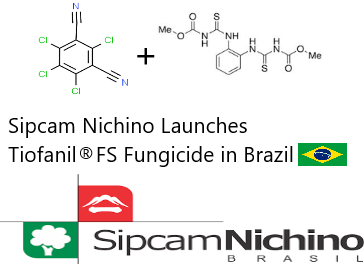Sipcam Nichino recently launched Tiofanil®FS, a peanut fungicide with Chlorothalonil + Thiophanate-Methyl, in Brazil.

Sipcam Nichino Launches Tiofanil®FS (Chlorothalonil+Thiophanate-Methyl) Fungicide for Peanuts in Brazil
Tiofanil®FS is an internal, contact, broad-spectrum fungicide formulated from the compound Chlorothalonil. Tiofanil®FS has technology to prevent fungal contamination of peanuts, which can cause considerable losses to production. Tiofanil®FS also helps growers manage fungicide resistance to other pathogens.
The new solution is recommended exclusively for seed treatment to protect the leguminous plant from stored grain rot (Aspergillus flavus), storage fungus (Penicillium flavus), and white mold (Sclerotinia sclerotiorum), according to information from the company.
About Tiofanil®FS
Active Ingredient : Chlorothalonil 425 g/L + Thiophanate-methyl 170 g/L
a. Chlorothalonil

Chlorothalonil Structure
- Description: Chlorothalonil is an organic compound mainly used as a broad spectrum, nonsystemic fungicide, with other uses as a wood protectant, pesticide, acaricide, and to control mold, mildew, bacteria, algae. Chlorothalonil is a broad-spectrum organochloride pesticide. Chlorothalonil is a halogenated fungicide, widely used to treat vegetable, ornamental, and orchard diseases. It is primarily used as a fungicide, bactericide, and nematicide, and has been reported to be effective on a wide range of vegetables and fruit crops. It is also used as a bactericide, nematicide, and mildew-preventing agent in paints.
- IUPAC: 2,4,5,6-tetrachlorobenzene-1,3-dicarbonitrile
- CAS RN:1897-45-6
- CHEMICAL CLASS: Fungicides (Chloronitrile) [1]
- Indication: FUNGICIDE
- Mechanism of Action (MOA) : Acts By Preventing Spore Germination And Zoospore Motility
b. Thiophanate-methyl

Thiophanate-methyl Structure
Thiophanate-methyl is an organic compound with the formula C₆H₄(NHC(S)NH(CO)OCH₃)₂. The compound is a colorless or white solid, although commercial samples are generally tan-colored. It was first registered to be used as a fungicide by the EPA in 1973. It is effective against a wide range of fungal pathogens including: eyespot and other diseases of cereals; scab on apples and pears; Monilia disease and Gloeosporim rot on apples; Monilia app. On stone fruit; Canker on fruit trees; powdery mildews on pome fruit, stone fruit, vegetables, cucurbits, strawberries, vines, roses. Thiophanate methyl is also used on almonds, pecans, tea, coffee, peanuts, soya beans, tobacco, chestnuts, sugar cane, citrus fruit, figs, hops, mulberries, and many other crops.
- IUPAC: methyl N-[[2-(methoxycarbonylcarbamothioylamino)phenyl]carbamothioyl]carbamate
- CAS RN: 23564-05-8
- CHEMICAL CLASS: Fungicides (Benzimidazole Precursor Fungicides; Carbamate Fungicides) [1]
- Indication: FUNGICIDE
- Mechanism of Action (MOA): ß-Tubulin Assembly In Mitosis
According to Cabral, Tiofanil® FS also has a recommendation for the producer to manage fungicide resistance to other pathogens. Fungicides, by the way, are the category of agrochemicals most demanded by peanut producers. These products accounted for 42% (US$41 million) of total crop protection sales in 2022 of US$98 million, according to consultancy Kynetec.
Kynetec’s most recent FarmTrak survey also showed that Brazilian peanuts have been gaining economic relevance, mainly due to the attractiveness of the foreign market. The consultancy found that Brazil is the 13th largest producer and the 7th country in the ranking of leguminous exporters. In 2022, around 285 thousand tons of peanuts were shipped, almost 40% of the national production, volume 44% above the 2019-20 cycle (198 thousand tons).
About Sipcam Nichino
Created in 1979, Sipcam Nichino results from the union between the Italian Sipcam, founded in 1946, specialist in post-patent agrochemicals, and the Japanese Nihon Nohyaku (Nichino). Nichino became the first agrochemical company in Japan, in 1928, and since its arrival on the market, it has been focused on innovation and the development of new molecules for crop protection.
Weblink: https://www.chemrobotics.com
- AgroPat Lite– Access 5500 pesticides with chemistry, Biology, Regulatory, and IP info. Covers the product information including formulation, combination, developer, innovator, existing intellectual property, regulatory requirement, biology data including spectrum, MOA, DFU, toxicity profile, and safety. (Designed for Business Development function)
-
- AgroPat Ultimate– In detailed Access 5500 pesticides with chemistry, Biology, Regulatory, and IP info. (Designed for Research & Development function)
- Indian Medicine Database –Approved Drugs, Medical Devices, Approved Regenerative Medical Products
- Weblink: https://imd.chemrobotics.com/
- Indian Pesticide Database (IPD)– All Indian Approvals, e.g. 9(3) and 9(4), etc.
- Global Agro Product Directory(More than 55countries approved product info. with relevant documents such as label, factsheet and monograph)
- Weblink: https://www.chemrobotics.com/pesticides-directory/
- Global MRL Database(More than 85 countries MRL info.)
- Jarvis– A Competitor Patents Watch Database for Agrochemical
- Technical Routes(More than 15000 routes of synthesis for Agrochemical & Pharmaceutical)
- Technical Suppliers(Provides technical supplier information)
- Company Directory– KSM Supplier(s) Database — More than 10 K Companies listed from Pharma / Agrochemical / Fine Chemical Domain with their product offering in Pharma / Agrochemical / Fine Chemical segment,
- Weblink: https://companydirectory.chemrobotics.com
- ChemRobotics SPC Database– Provides Patent SPC data Europe
- PharmVetPat –Access chemistry including ROS, KSM, Intermediate, Biology, Regulatory, and IP info for all pharm molecules.
-
- Weblink: https://chemroboticspharma.com/pharmVetPat


